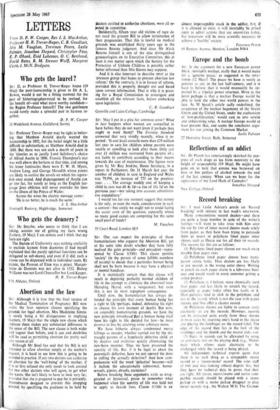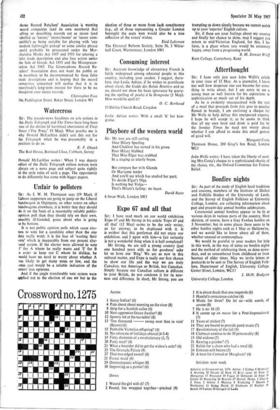Record breaking
Sir: I read Leslie Adrian's article on 'Record breaking' with interest in last week's SPECTATOR.
Many conscientious 'record dealers—and there are quite a large number in spite of the writer's feelings—will want to take issue with him over the use by EMI of inner record sleeves made solely from paper, as they have been trying to persuade them to revert to polythene lined paper inner sleeves such as Decca use for all their LP records. The reasons for this are as follows: (1) Polythene lined paper sleeves are much more durable than paper ones.
(2) Polythene lined paper sleeves have trans- parent centre holes. Thus dealers are less likely to put records in the wrong outer sleeve. Writing in pencil on each paper sleeve is a laborious busi- ness and would result in every customer getting a soiled product.
(3) Polythene is, I believe, more chemically, inert than paper and less likely to scratch the record, especially as paper today often has faults in it. Dust particles tend to stick to the polythene and not to the record, which is not the case with paper sleeves, and thus offer a cleaner record.
(4) Polythene sleeves are liable to contain static electricity—as are the records. However, records can be extracted quite easily from these sleeves in most cases by inserting one's hand in the sleeve and placing the forefinger on the record label. The edge of the record then lies in the fork of the forefinger and the thumb and the record slides out.
(5) Static in records can be alleviated by using an anti-static mat on the playing deck (e.g., Metro- mat) which allows static electricity to be discharged while the record is being played.
All independent technical experts agree that there is no such thing as a compatible stereo record or a 'stereo-mono' record. The sales staff of EMI and OGG (among others) dispute this, but they have no technical data to prove that they are right. All stereo, stereo/mono and stereo com- patible records should be played with a stereo pickup or with a mono pickup designed to play stereo records (e.g., the Walton M.1). The Gramo-
phone Record Retailers' Association is warning record companies (and its own members) that ;filing or describing records cut as stereo (and labelled as 'stereo,' 'stereo/mono' or `stereo com- patible) as being suitable for playing with 'any modern lightweight pickup' or some similar phrase could probably be prosecuted under the Mer- chandise Marks Act 1887 and 1953 for uttering a false trade description and also face action under the Sale of Goods Act 1893 and the Misrepresen- tation Act 1967. The Gramophone Record Re- tailers' Association does not want the public or its members to be inconvenienced by these false trade descriptions and is hoping that the record companies concerned will realise that it is in everybody's long-term interest for there to be no deception over stereo records.



































 Previous page
Previous page